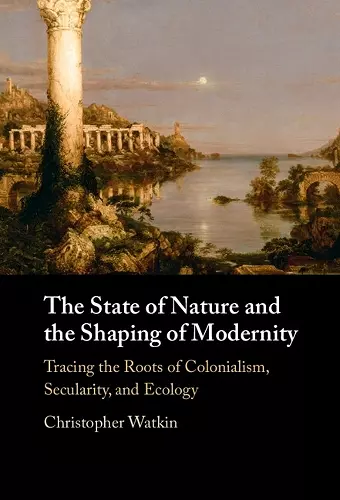The State of Nature and the Shaping of Modernity
Tracing the Roots of Colonialism, Secularity, and Ecology
Format:Hardback
Publisher:Cambridge University Press
Published:18th Dec '25
Should be back in stock very soon

Shows how Hobbes's, Locke's and Rousseau's states of nature make sense of conflicting Western attitudes to colonialism and ecology.
By exploring the distinct accounts of the state of nature in the writing of Hobbes, Locke and Rousseau, this book offers a fresh perspective on some of the most pressing debates of our time, showing how the state of nature idea provides a powerful lens through which to focus the complex forces shaping today's political and cultural landscape.The state of nature is a powerful idea at the heart of the fragmented and sometimes conflicting stories the modern West tells about itself. It also makes sense of foundational Western commitments to equality and accumulation, freedom and property, universality and the individual. By exploring the social and cultural imaginaries that emerge from the distinct and often contradictory accounts of the state of nature in the writing of Hobbes, Locke and Rousseau, The State of Nature and the Shaping of Modernity offers a fresh perspective on some of the most pressing debates of our time, showing how the state of nature idea provides a powerful lens through which to focus the complex forces shaping today's political and cultural landscape. It also explores how ideas about human nature and origins drive today's debates about colonialism, secularism, and the environment, and how they can shed new light on some of society's most heated debates.
'This is the most meticulous, comprehensive, imaginative and accessible treatment of the state of nature that I have come across. Professor Watkin provides a reliable and generative guide to the past, present, and future potential of a topic that is central to social theory, intellectual history, and constitutional and international law.' Mark Somos, Max Planck Institute for Comparative Public Law and International Law and author of American States of Nature: The Origins of Independence, 1761-1775 (OUP, 2019)
'The concept of the state of nature has been pivotal in the history of political thought, especially from early modernity onwards. Moving beyond its impact on social contract theory and distributive justice, Christopher Watkin shows how it influenced the ways in which we think about colonialism, secularization, and ecology, persuasively arguing that it continues to shape our sense of ourselves and the political world we inhabit. In so doing, The State of Nature and the Shaping of Modernity boldly presents a much-needed corrective to influential but naive assumptions behind much of contemporary political thought.' Ioannis D. Evrigenis, Alice Tweed Tuohy Professor of Government and Ethics, Claremont McKenna College, and author of Images of Anarchy: The Rhetoric and Science in Hobbes's State of Nature (CUP, 2016)
'Who would have thought that there was anything more to say about the state of nature – that bizarre hypothetical history famously penned by Thomas Hobbes, John Locke, and Jean-Jacques Rousseau? And yet, in this beautifully written and persuasively argued work, Watkin demonstrates the continued appeal of the state of nature motif in shaping modern Western politics and practices. Deftly moving from the works of seventeenth- and eighteenth-century contractarians to some of the most charged debates in contemporary politics (on colonialism, secularism, and environmental discourse), The State of Nature and the Shaping of Modernity is a must-read for anyone interested in the making of the modern West.' Vanita Seth, Associate Professor of Politics, University of California Santa Cruz, and author of Europe's Indians: Producing Racial Difference, 1500–1900 (Duke UP, 2010)
'As Christopher Watkin shows, the state of nature that we usually associate with Hobbes and Rousseau's classics is a veritable accordion of a concept, stretching and compressing all manner of ideas and images from modernity to the apocalypse. The State of Nature and the Shaping of Modernity is a philosophically exact, historically erudite, and an all-round very elegant demonstration of the near-infinite uses to which the concept has been put.' Stefanos Geroulanos, Director of the Remarque Institute and a Professor of European Intellectual History, New York University, and author of The Invention of Prehistory: Empire, Violence, and Our Obsession with Human Origins (Liveright, 2024)
'The state of nature is often regarded as a dead remnant of seventeenth- and eighteenth-century thought. Christopher Watkin focuses on the three most significant accounts: those of Hobbes, Locke, and Rousseau. He argues cogently that these doctrines, even (or especially) in their oppositions, continue to cast a long shadow, not least over those who claim most vociferously to reject them. Using Ricoeur, Foucault, and others, he argues that these doctrines form a 'social imaginary,' that shapes or exemplifies past and present debates over colonial, secular, and ecological issues.' Christopher Kelly, Professor Emeritus, Department of Political Science, Boston College, and co-editor The Collected Writings of Rousseau
'The State of Nature and the Shaping of Modernity is an exceptional work of high scholarship. Watkin has taken on a behemoth of a literature spanning hundreds of years and managed to shape it into a coherent and illuminating vision of Euro-Western modernity. He demonstrates with crystal clarity how the concept of the state of nature serves as a fundamental axis upon which many of modernity's most cherished and influential beliefs turn. The work is wonderfully organized, beautifully written, and meticulously researched—a shimmering gemstone of a book.' Thomas Nail, Distinguished Scholar and Professor of Philosophy, University of Denver
'In this beautifully written and thoroughly researched book, Christopher Watkin makes a persuasive case for the enduring significance of the idea of 'the state of nature'. He provides an illuminating account of the key thinkers in this tradition, revealing how our present, contested assessments of the meaning and legitimacy of the West can be traced back to different formulations of this pivotal idea. Original, thought-provoking, and highly relevant.' Peter Harrison, Professorial Research Fellow at the University of Notre Dame, Australia, and Professor Emeritus of History and Philosophy at the University of Queensland
ISBN: 9781009670463
Dimensions: unknown
Weight: unknown
378 pages